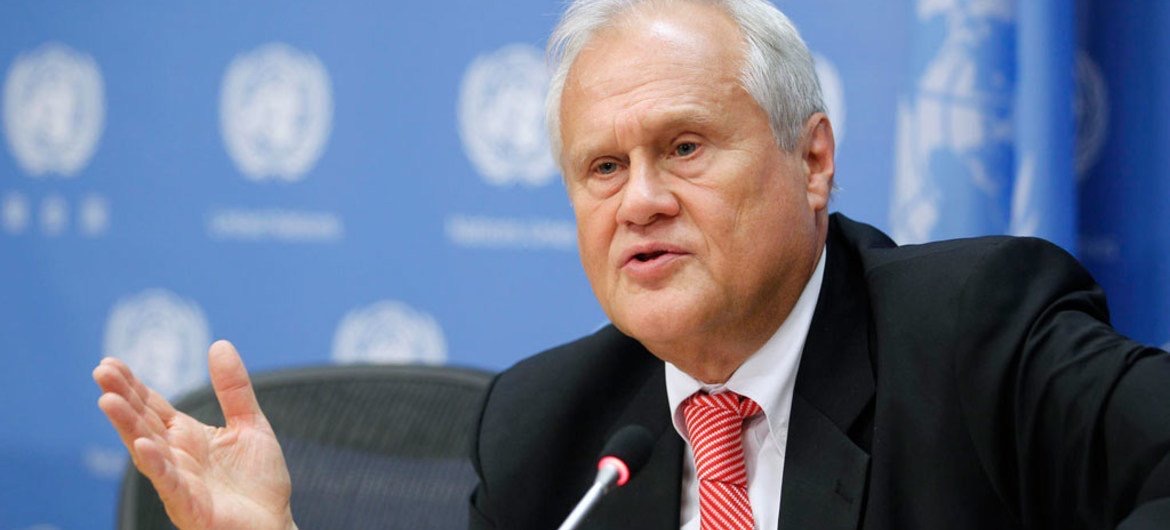ASTANA – Central Asia is a region with its own specificities and contradictions, where the integration process is about to develop, and Kazakhstan may play a crucial role as a catalyst, said Dr. Martin Sajdik from the Austrian Institute for European and Security Policy (AIES) in an interview with Astana Times. Dr. Sajdik, who specializes in political developments in post-Soviet countries, shared his thoughts on political transformation in Kazakhstan and the role of the country in promoting peace and stability in Central Asia.

Dr. Martin Sajdik. Photo credit: news.un.org.
Kazakhstan has just had a parliamentary election. What is your view on political reforms, and political transformation taking place in the country?
Well, to begin with, I have quite a background in understanding the political processes of the Soviet Union. I started in Moscow in 1972-1973, studying International Law at Moscow State University. I then worked at the [Austrian] Embassy. I was there during the period which is known in history as “zastoy” and then “perestroika.” I was in Moscow during the days of the “putsch” on August 21, 1991. I have seen all the developments of the different post-Soviet countries after 1991. And nearly all post-Soviet countries have undergone periods of internal conflicts in different forms. Now we also witness an interstate conflict between Russia and Ukraine.
Kazakhstan is not an exception to these developments. But I want to mention that these internal conflicts have really triggered changes in different countries. Kyrgyzstan and Ukraine are illustrative examples of that change. Returning back to Kazakhstan, protests which took place in January last year triggered changes and now we can find the country in the process of transformation. I think it is important now to establish trust between state institutions and the people of this country. So both ruling structures and people, citizens of the country, have confidence in each other. This is an interesting period now in Kazakhstan, as the main question remains the same: What comes afterward?
Is it possible to forecast what happens next?
We can only see trends. The question is, again, how much this country has invested in education for the wider strata of society. I mean not only in higher education but also in vocational training and the creation of jobs. Plus, there is a remaining question of the maldistribution of wealth. So, all further developments can be triggered by these trends as a foundation and by this new parliament.
Kazakhstan has played a role in promoting peace and stability in Central Asia. How do you see Kazakhstan’s role evolving in the future of regional and international diplomacy?
Central Asia is a region with its own specificities and contradictions. It is a region with basically two big countries and two small countries, and one country which has gone its own way. My question is: has Kazakhstan tried to play a role in the Kyrgyz-Tajik conflict? You have to know the answer to this question if you want to play a role in it. There is a potential for Kazakhstan to play a role in all regional processes. The Kyrgyz-Tajik issue is not yet solved, as are other huge issues on water, infrastructure, border control, and customs. All these issues need more cooperation, in my view. Look at border control between Kazakhstan and Kyrgyzstan and answer the question – is it what Kazakhstan really wants? And if not, what role does Kazakhstan want to play in this specific sector?
How do you see the balance of power shifting in Central Asia in the coming years?
Well, you have two big neighbors. You have a border with Russia of more than 7,500 kilometers. I do not know exactly how long the border is with China, but you have a real issue with constructing your relationship with your two big neighbors. There is also a relatively big neighbor in the south, which is Uzbekistan. Plus, there is the Caspian Sea which links you with the Caucasian countries. But let me tell you, I was an [Austrian] ambassador in China and from China was accredited to Mongolia. And if you know, Mongolia has only two neighbors: Russia and China. But they managed to have a full-fledged democracy in between. Mongolia is a relatively rich country with all the mineral resources and much fewer people living on its territory than in Kazakhstan. What I want to say is that all is possible if there is a will and there is trust between the ruling strata in the society and its own people.
When speaking about will, do you mean political will?
Yes. The case of Mongolia shows that developing its own way to a full-fledged democracy is possible.
So, are we talking more about political challenges or opportunities for Kazakhstan in the current geopolitical situation?
I think, at the moment, it is more about opportunities. The answer is simple: you have to believe in your own strength and capabilities. Remember when the decision was taken to move the capital here to this place, people asked what does this mean – Tselinograd? But look at what it is now. It was the right decision and that was a decision made in full self-confidence. Use the example of your own capital as it shows Kazakh self-confidence. Opportunities will arise out of this more than challenges.
